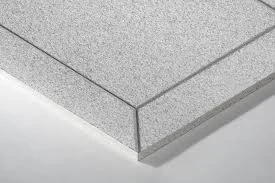Dec . 15, 2024 03:15 Back to list
mineral wool board r value
Understanding Mineral Wool Board and Its R-Value
Mineral wool board, also known as rock wool or stone wool, is a highly versatile insulation material widely used in residential and commercial construction. This type of insulation excels in thermal and acoustic performance, making it a popular choice among builders and homeowners looking for energy-efficient solutions. One significant measure of any insulation material's effectiveness is its R-value, which indicates its resistance to heat flow. In this article, we will explore the properties of mineral wool board, its R-value, and why it is an excellent choice for insulation.
What is Mineral Wool Board?
Mineral wool board is made from natural rock materials, commonly basalt or diabase, which are melted and spun into fine fibers. These fibers are then compressed and formed into rigid boards suitable for various applications. Mineral wool board is non-combustible, water-resistant, and provides excellent sound absorption properties. It is often used in wall assemblies, roofs, floors, and even acoustical ceilings.
The Importance of R-Value
The R-value measures the thermal resistance of insulation materials. The higher the R-value, the better the material insulates against heat loss or gain. For effective insulation, homeowners and builders should consider the climate when selecting insulation materials, as different regions may require varying levels of thermal resistance.
Mineral wool boards typically have an R-value ranging from R-3.0 to R-4.2 per inch of thickness, depending on the specific product and manufacturer. This makes it comparable to other insulation materials like fiberglass and foam board. The R-value of mineral wool can change slightly based on its density and the specific formulation used in the manufacturing process.
Benefits of Using Mineral Wool Board Insulation
1. Energy Efficiency With its commendable R-value, mineral wool board helps to reduce energy costs by maintaining stable indoor temperatures. This is particularly beneficial in climates with extreme temperatures, where heating and cooling systems are in constant use.
mineral wool board r value

2. Fire Resistance One of the standout characteristics of mineral wool is its fire-resistant nature. It can withstand high temperatures, making it an ideal choice for safety-conscious builders. It does not support combustion, ensuring better protection for properties and occupants.
3. Sound Absorption Mineral wool board also excels in soundproofing applications. Its dense composition helps to dampen sound transmission, making it suitable for use in multi-family units, recording studios, and other environments where noise control is crucial.
4. Moisture Resistance Unlike traditional cellulose insulation, mineral wool does not absorb water. This property not only helps in preventing mold and mildew growth but also ensures that the insulation maintains its R-value and effectiveness over time.
5. Sustainability Many manufacturers produce mineral wool boards using recycled materials, making them an environmentally friendly choice. They are also recyclable at the end of their life cycle, minimizing landfill contributions.
Installation Considerations
When installing mineral wool board, proper technique is crucial to achieve the desired R-value. It can be cut to fit various spaces, and the boards should be snugly fitted between framing members to minimize gaps that can lead to thermal bridging. Using appropriate safety gear, such as gloves and masks, during installation is also advisable, as the fine fibers can irritate the skin and lungs.
Conclusion
Mineral wool board is an exceptional insulation material that offers numerous advantages, including impressive thermal performance indicated by its R-value, fire resistance, sound absorption capabilities, and moisture resistance. As energy efficiency becomes increasingly important in construction and renovation projects, mineral wool board stands out as a reliable, eco-friendly insulation option. Whether you're building new structures or updating existing ones, considering mineral wool board can lead to more comfortable and energy-efficient living spaces. With its myriad benefits, it’s no wonder that mineral wool continues to gain popularity in the world of construction and insulation.
-
Quality Ceiling Trap Doors & Access Panels | Easy & Secure AccessNewsAug.30,2025
-
Durable Ceiling T Grid Systems | Easy InstallationNewsAug.29,2025
-
PVC Gypsum Ceiling: Durable, Laminated Tiles for Modern SpacesNewsAug.28,2025
-
Pvc Gypsum Ceiling Is DurableNewsAug.21,2025
-
Mineral Fiber Board Is DurableNewsAug.21,2025
-
Ceiling Tile Clip Reusable DesignNewsAug.21,2025







